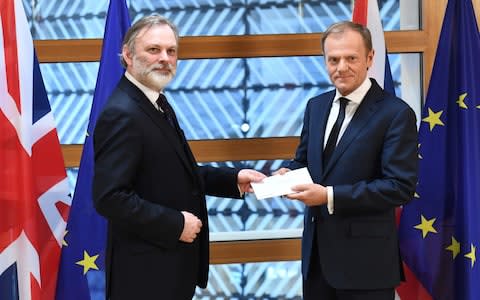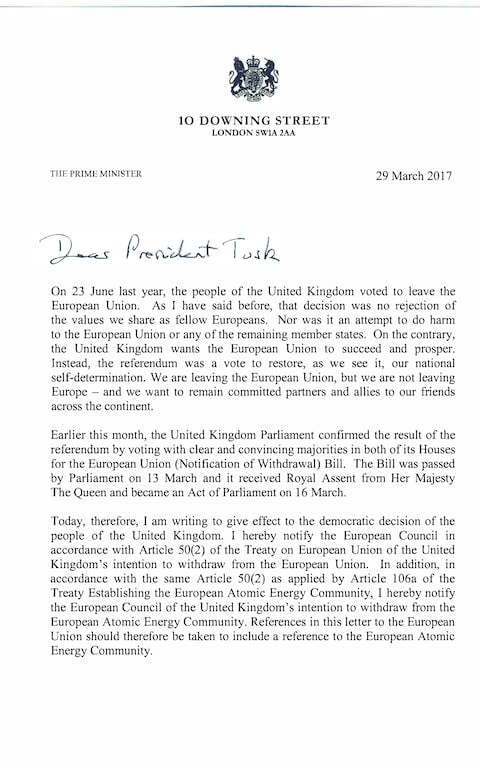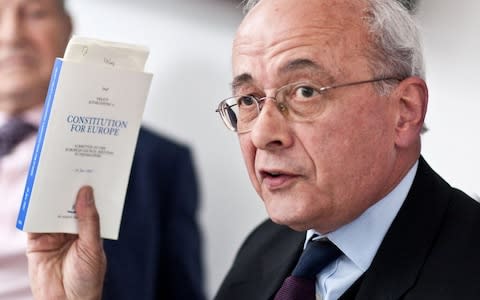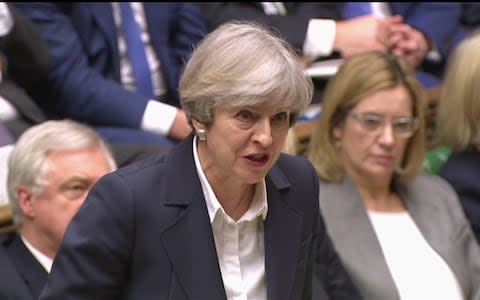What is Article 50? The only explanation you need to read

Brexit is the greatest disaster to befall the European Union (EU) in its 60-year history - but the referendum in which British voters opted to leave the bloc did not automatically signal the country's exit. That was the job of Article 50.
What exactly is Article 50?
Article 50 of the Treaty of Lisbon gives any EU member state the right to quit unilaterally, and outlines the procedure for doing so. It gives the leaving country two years to negotiate an exit deal and once it's set in motion it can't be stopped except by unanimous consent of all member states.
No country has ever left the EU before, and there was no way to legally leave the EU before the Treaty of Lisbon was signed in 2007.
The Lisbon Treaty, which became law in December 2009, is designed to make the EU "more democratic, more transparent and more efficient" and is an agreement signed by the heads of state and governments of countries that are EU members.

How long will Brexit take?
Prime Minister Theresa May triggered Article 50 shortly before 12:30pm on March 29 2017. For the next two years, Britain will thrash out a deal for leaving the EU, a process that is proving to be lengthy and complicated.
Any deal must be approved by a “qualified majority” of EU member states and can be vetoed by the European Parliament.
The process is supposed to take two years but many people believe that it could take longer. The timescale can be extended, but only by the unanimous consent of the European Council. So every other member state Government would have to agree.
Triggering Article 50 starts the clock running. After that, the Treaties that govern membership no longer apply to Britain.

The terms of exit will be negotiated between Britain’s 27 counterparts, and each will have a veto over the conditions. It will also be subject to ratification in national parliaments, meaning, for example, that Belgian MPs could stymie the entire process.
Two vast negotiating teams have been created, far larger than those seen in the British renegotiation under David Cameron. The EU side is headed by Michel Barnier, while David Davis is the UK's Brexit secretary.
Business leaders want the easiest terms possible, to prevent economic harm. But political leaders say the conditions will be brutal to discourage other states from following suit.
Can Article 50 be reversed?
There is no definitive answer as to whether Britain could cancel Brexit by revoking Article 50.
However, cabinet members, lords, senior EU officials and countless lawyers have weighed in on the issue.
Donald Tusk, the president of the European Council has said that “ formally, legally,” it can indeed be reversed. David Davis, however, says he “doesn’t know.”
The UK Supreme Court, in its ruling on the Gina Miller case, operated under the assumption that Article 50 would not be revoked within the next two years. However, it did not issue a judgement on whether Article 50 could be revoked.
Lord Kerr, who helped draft Article 50 as a member of the European Convention claims it is possible.
“Intentions can change...the Article is about voluntary withdrawal, not about expulsion: we don't have to go if at any stage, within the two years, we decide we don't want to,” he said in November.

Lord Kerr's intervention was widely reported, with some anti-Brexit campaigners hailing him as the definitive authority on the issue.
But Richard Bull, the legal director of Pinsent Masons, has warned this is simply not how the law works.
“Kerr believes his voice outweighs others because he authored Article 50,” Mr Bull said. “It does not, however, fall to the authors of legal instruments to decide on their interpretation.”
Ironically, as Article 50 is a piece of European law, the EU’s European Court of Justice would have the final say on whether the countdown to Brexit can be reversed.
And therein lies the unsatisfactory, but most accurate, answer to the question: the UK might be able to revoke Article 50, but only if it gets permission from the EU.

How could the UK create a new life outside of the EU quickly?
Theresa May plans to transpose EU laws onto the British statute books as part of her "Great Repeal Bill", allowing her Government to later analyse and dump whatever laws it sees are not fit for purpose.

It means that the Government would have to perform three acts simultaneously:
Negotiate a new deal with Brussels
Win a series of major bilateral trade deals around the world
Revise its own governance as EU law recedes
David Davis will be supervising the process as Secretary of State for Exiting the European Union.
Officials expect the scrapping of EU law could result in an avalanche of new legislation in every corner of Whitehall – perhaps 25 Bills in every Queen’s Speech for a decade.
Hundreds of Treasury lawyers and experts would have to be hired for areas – such as health and safety, financial services and employment – where Britain had lost competence to Brussels. Meanwhile, a Trade Ministry will be required, with hundreds of new negotiators, to establish new deals around the world.
The caseload will be so heavy that civil servants have been warned that any non-Brexit related bills are likely to fall by the wayside in the run-up to "Exit Day," which is 29 March 2017.
What does Article 50 actually say?
There are five elements to Article 50 of the Treaty of Lisbon:
Any Member State may decide to withdraw from the Union in accordance with its own constitutional requirements.
A Member State which decides to withdraw shall notify the European Council of its intention. In the light of the guidelines provided by the European Council, the Union shall negotiate and conclude an agreement with that State, setting out the arrangements for its withdrawal, taking account of the framework for its future relationship with the Union. That agreement shall be negotiated in accordance with Article 218(3) of the Treaty on the Functioning of the European Union. It shall be concluded on behalf of the Union by the Council, acting by a qualified majority, after obtaining the consent of the European Parliament.
The Treaties shall cease to apply to the State in question from the date of entry into force of the withdrawal agreement or, failing that, two years after the notification referred to in paragraph 2, unless the European Council, in agreement with the Member State concerned, unanimously decides to extend this period.
For the purposes of paragraphs 2 and 3, the member of the European Council or of the Council representing the withdrawing Member State shall not participate in the discussions of the European Council or Council or in decisions concerning it. A qualified majority shall be defined in accordance with Article 238(3)(b) of the Treaty on the Functioning of the European Union.
If a State which has withdrawn from the Union asks to rejoin, its request shall be subject to the procedure referred to in Article 49.

